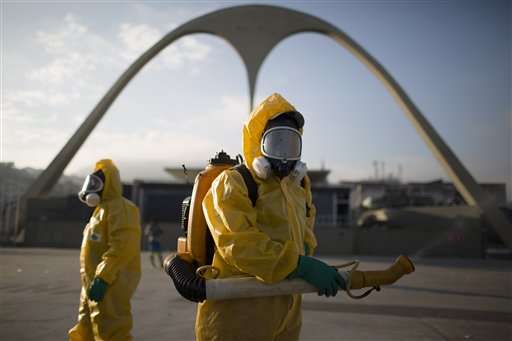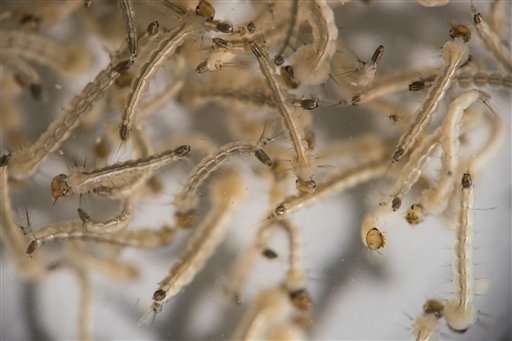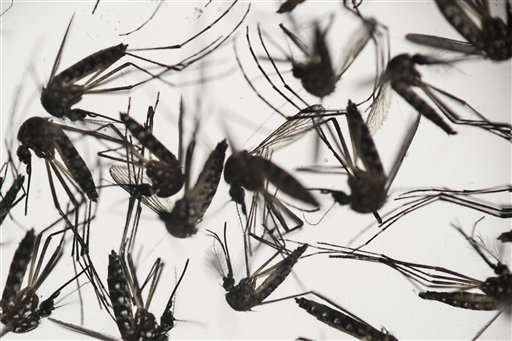Eradication of Zika-spreading mosquito in Brazil unlikely

In the 1940s and 1950s, Brazilian authorities made such a ferocious assault on Aedes aegypti—the mosquito that spreads the Zika virus—that it was eradicated from Latin America's largest country by 1958.
But Aedes aegypti returned, and now Brazil has launched another offensive against the pest, employing hundreds of thousands of troops to fumigate and educate people about how to eliminate its habitats. The assault is part of President Dilma Rousseff's "war" on the Zika virus, which the Centers for Disease Control and Prevention says can cause devastating birth defects.
But eradication experts say there is little chance Brazil can come anywhere near stamping out the pest like it did a half century ago. The world is different, with globalization bringing more travelers and trade across borders. And Brazil is different; its resources are limited as the country suffers through its worst recession in decades and its president is focused on battling impeachment for allegedly breaking fiscal rules in managing government funds.
Eradication efforts so far have been disjointed and more public relations than substance, critics say.
"Just sprinkling insecticide here and there is not enough," said Rodrigo Cesar Magalhaes, a Brazilian historian and expert on the previous eradication campaigns. "Brazil must fully integrate all its actions (against mosquitoes) and control its borders."

Even before the virus reached crisis levels early this year, Brazil had trouble maintaining routine eradication efforts. An Associated Press investigation found that cities and states in Brazil's northeast ran out of larvicide for several months last year.
Health Minister Marcelo Castro said shipments have since been restored. He has repeatedly defended the government's efforts, arguing the most effective way to fight mosquitoes isn't with chemicals but rather by eliminating breeding sites.
In the decades before 1958, the driving force for the campaigns was yellow fever, also transmitted by the Aedes aegypti. Periodic outbreaks in Brazil and in cities across the Americas, including the United States, took tens of thousands of lives throughout much of the early 20th century.
"Mata Mosquito," or "Mosquito Killer," brigades would sweep across neighborhoods, going door-to-door, sometimes entering by force, to hunt mosquitoes and squish their larvae. People who lived through the campaigns say the brigades, made up largely of municipal workers, were a year-round presence.

Rolando Saba, an 84-year-old retired engineer, said the brigades were ubiquitous but kept a low profile, in sharp contrast to what he considers the flash efforts today.
Saba said he was put off when, during a much-publicized recent weekend of spraying, ministers and the president of the central bank were among those going door to door.
"Does that make any sense?" Saba asked. "It's just propaganda."
The World Health Organization has deemed Zika an "international emergency" and its global nature could hurt Brazil's fight against it.

Indeed, many scientists believe Zika was introduced to Brazil during the 2013 Confederations Cup soccer tournament. And larvae of disease-carrying Aedes aegypti can last up to a year, meaning eradication efforts are threatened by every international traveler and every import—unavoidable risks in a country that is visited by millions of tourists and is also among the world's most important emerging economies.
A population boom and mass migration to cities are also potential game-changers in the anti-Zika fight. Take Recife, the capital of the impoverished northeast state of Pernambuco, one of the areas hit hardest by Zika. In 1940, the population was just under 350,000. Today it's nearly 4 million. Teeming slums, a byproduct of mass migration to Brazilian cities in the 1960s and 1970s, are a mosquito's paradise.
"Beyond the Mata Mosquito, in those days education (about mosquitoes) was much better and there were not so many favelas," said 75-year-old Isaura Martinez, who lives in a Rio retirement home.
Mosquito-eradication efforts have taken on new urgency in Brazil with the Olympic Games set for August. But a look back at eradication efforts after 1958 serve as a cautionary tale, especially when it comes to getting neighboring countries to participate.
In 1963, when the mosquito started returning to Brazil, a WHO council meeting resolution urged "the governments of the countries and territories that are still infested with Aedes aegypti to give the eradication campaign the necessary priority so that the entire hemisphere may be freed of this vector as soon as possible."
Jose Carvalheiro, professor of the University of Sao Paulo who was part of campaigns in the 1950s to eradicate Chagas disease, spread by insects known as "kissing bugs," said the military government that came to power in a 1964 coup had other priorities. While eradication campaigns continued, they never reached the intensity of the previous decades.
"When the Aedes returned, the sensation at the time was that it was inevitable," he said.
© 2016 The Associated Press. All rights reserved.
















